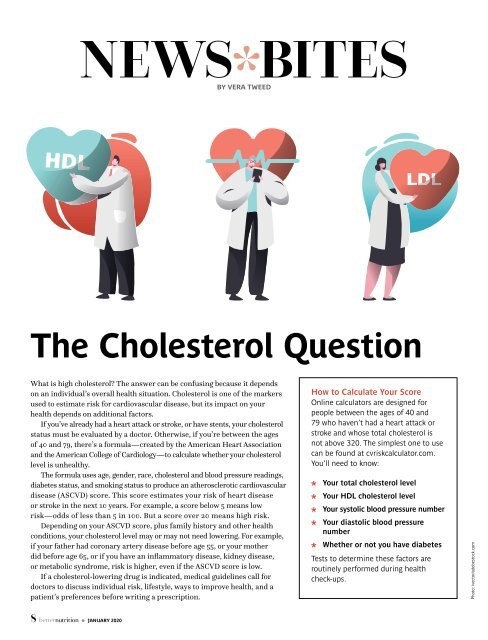Create successful ePaper yourself
Turn your PDF publications into a flip-book with our unique Google optimized e-Paper software.
NEWS*BITES<br />
BY VERA TWEED<br />
The Cholesterol Question<br />
What is high cholesterol? The answer can be confusing because it depends<br />
on an individual’s overall health situation. Cholesterol is one of the markers<br />
used to estimate risk for cardiovascular disease, but its impact on your<br />
health depends on additional factors.<br />
If you’ve already had a heart attack or stroke, or have stents, your cholesterol<br />
status must be evaluated by a doctor. Otherwise, if you’re between the ages<br />
of 40 and 79, there’s a formula—created by the American Heart Association<br />
and the American College of Cardiology—to calculate whether your cholesterol<br />
level is unhealthy.<br />
The formula uses age, gender, race, cholesterol and blood pressure readings,<br />
diabetes status, and smoking status to produce an atherosclerotic cardiovascular<br />
disease (ASCVD) score. This score estimates your risk of heart disease<br />
or stroke in the next 10 years. For example, a score below 5 means low<br />
risk—odds of less than 5 in 100. But a score over 20 means high risk.<br />
Depending on your ASCVD score, plus family history and other health<br />
conditions, your cholesterol level may or may not need lowering. For example,<br />
if your father had coronary artery disease before age 55, or your mother<br />
did before age 65, or if you have an inflammatory disease, kidney disease,<br />
or metabolic syndrome, risk is higher, even if the ASCVD score is low.<br />
If a cholesterol-lowering drug is indicated, medical guidelines call for<br />
doctors to discuss individual risk, lifestyle, ways to improve health, and a<br />
patient’s preferences before writing a prescription.<br />
How to Calculate Your Score<br />
Online calculators are designed for<br />
people between the ages of 40 and<br />
79 who haven’t had a heart attack or<br />
stroke and whose total cholesterol is<br />
not above 320. The simplest one to use<br />
can be found at cvriskcalculator.com.<br />
You’ll need to know:<br />
**<br />
**<br />
**<br />
**<br />
Your total cholesterol level<br />
Your HDL cholesterol level<br />
Your systolic blood pressure number<br />
Your diastolic blood pressure<br />
number<br />
**<br />
Whether or not you have diabetes<br />
Tests to determine these factors are<br />
routinely performed during health<br />
check-ups.<br />
Photo: ivector/adobestock.com<br />
8 • JANUARY <strong>2020</strong>

















